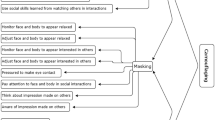Abstract
It is accepted practice in child psychiatry to use more than one source of information in assessing behavioural problems in children and adolescents. Employing standardized tools for these assessments allows cross-cultural comparisons and better interchange of the findings. Achenbach's Child Behavior Checklist (CBCL) and Teacher's Report Form (TRF) are two widely accepted instruments that were standardized in Greece within the framework of the European Network for the Study of Hyperkinetic Disorder. We studied the Conners-28 teacher questionnaire in a Greek community sample of primary schoolchildren aged 6–12 years. The factor structure showed to be similar to that originally reported from the USA. Discrimination between the referred and nonreferred sample was high, especially for the Inattentive-passive scale. Conners-28 scores were highly correlated with the TRF (scored by the same informant), much less so with the CBCL (scored by a different informant). Our study demonstrates the usefulness and applicability of the Conners-28 item questionnaire.
Similar content being viewed by others
Author information
Authors and Affiliations
Additional information
Accepted: 9 December 1998
Rights and permissions
About this article
Cite this article
Roussos, A., Richardson, C., Politikou, K. et al. The Conners-28 teacher questionnaire in clinical and nonclinical samples of Greek children 6 –12 years old. European Child & Adolescent Psychiatry 8, 260–267 (1999). https://doi.org/10.1007/s007870050100
Issue Date:
DOI: https://doi.org/10.1007/s007870050100



